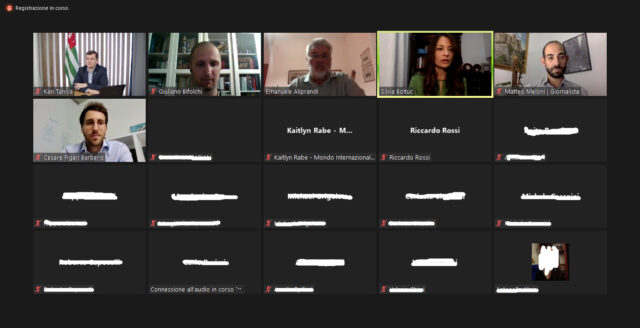
On October 11th, 2023, SpecialEurasia, in collaboration with Mondo Internazionale ASP and MInter Group srl, organised the webinar in the Italian language titled “Geopolitical and Social Dynamics in the Caucasus: current challenges and future developments.” The primary objective of this event was to delve into the intricate situation prevailing in the Caucasus region.
SpecialEurasia Managing Director, Silvia Boltuc, moderated the event and adeptly introduced the distinguished panel of speakers. In her introduction, she underscored the heightened concern of recent events in the Caucasus, particularly the Azerbaijani military incursion into Nagorno-Karabakh, culminating in Stepanakert’s capitulation and an ensuing severe humanitarian crisis.
During the webinar, SpecialEurasia Research Manager, Giuliano Bifolchi, directed the spotlight towards the North Caucasus, elucidating its pivotal role in shaping the Kremlin’s both domestic and foreign policy strategies.
He expounded on Moscow’s substantial financial investments aimed at ameliorating socioeconomic conditions, generating over 400 thousand employment opportunities, and enticing foreign direct investments (FDIs) for regional infrastructural projects.
However, Bifolchi identified the persisting challenge posed by local interethnic tensions and burgeoning independence movements, largely catalysed by the onset of the Ukraine conflict.
Additionally, he shed light on the looming spectre of jihadist propaganda, which seeks to exert influence and incite local populations to take up arms against the central Russian authority.
Kan Taniya, serving as the Ambassador-at-Large of the Ministry of Foreign Affairs of the Republic of Abkhazia and Chief of Staff at the World Abaza Congress, provided a comprehensive overview of Abkhazia’s last three decades.
He then turned the focus to the present, highlighting the ongoing struggle for full international recognition that the country grapples with. Taniya emphasized the pivotal role of Russian support, underscoring Moscow’s position as the main strategic partner of Sukhum.
Emanuele Aliprandi, an accomplished independent researcher and author renowned for his extensive work on Armenia and Nagorno-Karabakh/Artsakh, took on the formidable task of condensing recent events pertaining to the Republic of Nagorno-Karabakh.
The international spotlight was drawn to this region due to Baku’s military offensive, which, after over nine months of a stringent blockade, resulted in a substantial exodus of local Armenians and engendered a pressing regional humanitarian crisis. Aliprandi’s meticulous account shed light on the far-reaching consequences of this conflict.
Matteo Meloni, a distinguished EastWest journalist and an expert in international relations, unveiled his comprehensive research on the US strategic pursuits in the Caucasus.
Despite the prevailing focus on current events in the Middle East and the ensuing support extended to Israel by Washington, Meloni pointed out that the United States maintains a vested interest in the Caucasus. Washington’s ambition is to assume a more substantial role, countering Russian influence and exerting control over the Turkish-Azerbaijani alliance.
Recognising the Caucasus as a natural conduit between Europe and Asia, particularly with its abundant reservoirs of oil and natural gas, Meloni’s analysis emphasized that the United States cannot afford to overlook this pivotal region.
The academic researcher Cesare Figari Barberis, thanks to his in-depth investigation in Georgia, delved into Tbilisi’s complex position straddling the realms of Western and Russian Federation influence.
He observed that a substantial majority of Georgians identify themselves as Europeans, nurturing hopes of EU membership. However, the country faces its fair share of challenges.
Not only has the incumbent government faced repeated accusations of pro-Russian leanings, but Georgia must also grapple with issues pertaining to its Muslim minority, human rights, civil society, and LGBTQ+ community if it aspires to genuinely secure a place within the European Union.
Following the insightful presentations, the speakers fielded questions from the engaged audience, igniting a dynamic and stimulating debate. This exchange not only delved into the intricate nuances of various regional concerns but also scrutinised the local geopolitical risks at play.
The interactive session provided a platform for diverse perspectives to converge, fostering a deeper understanding of the complexities surrounding the Caucasus region. This spirited discussion served as a testament to the event’s success in not only disseminating knowledge but also in actively engaging the audience in a constructive dialogue about the pressing matters facing the region.
Do you like SpecialEurasia reports and analyses? Has our groundbreaking research empowered you or your team? Now is your chance to be a part of our mission! Join us in advancing independent reporting and unlocking the secrets of Eurasia’s complex geopolitical landscape. Whether through a one-time contribution or a monthly/yearly donation, your support will fuel our relentless pursuit of knowledge and understanding. Together, let’s pave the way for a brighter future. DONATE NOW and secure your place in shaping the geopolitical narrative.
